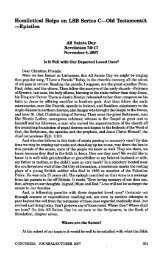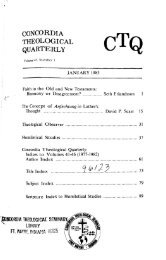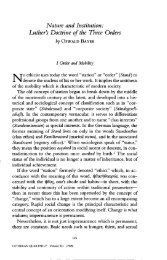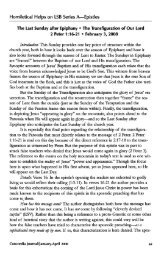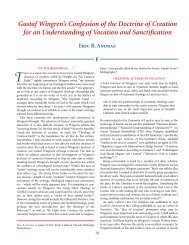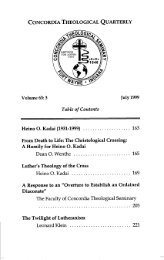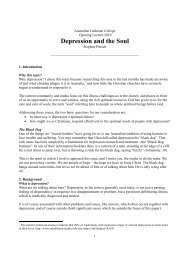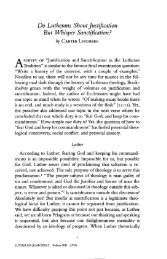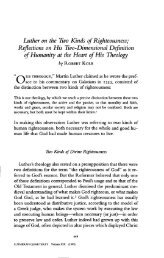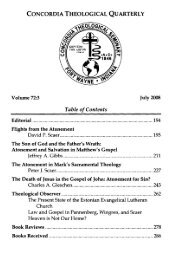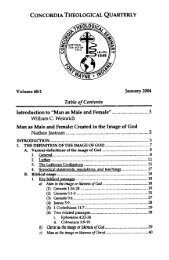Living with A Clear Conscience John W Kleinig Even though ...
Living with A Clear Conscience John W Kleinig Even though ...
Living with A Clear Conscience John W Kleinig Even though ...
- No tags were found...
You also want an ePaper? Increase the reach of your titles
YUMPU automatically turns print PDFs into web optimized ePapers that Google loves.
<strong>Living</strong> <strong>with</strong> A <strong>Clear</strong> <strong>Conscience</strong><strong>John</strong> W <strong>Kleinig</strong><strong>Even</strong> <strong>though</strong> Christian spirituality has to do <strong>with</strong> a way of life, it is not just a religiousphilosophy of life that helps us to understand our place in God’s world, nor is it just areligious code of behaviour that maps out how best to live the spiritual life here onearth. Its main focus is not on how to think or feel or act religiously, but on how tolive, like St Paul, <strong>with</strong> a good clear conscience before God and the people around us(Acts 23:1; 24:16; 2 Tim 1:3). Its basic premise is that, for better or worse, the state ofour conscience colours our experience of God. Paul sums up this point well when hewrites these words in Titus 1:15-16:To the pure, all things are pure, but to the defiled and unbelievers, nothing ispure; but both their minds and consciences are defiled. They profess to knowGod, but they deny him by their works. They are detestable, disobedient andunfit for any good work.Let me explain what Paul is getting at. How we receive God and respond to his worddepends on the state of our conscience. Take a mirror! If it is stained, or if its surfaceis not uneven, it does not receive and accurately reflect what is in front of it. Thecleaner the mirror, the clearer its reception and reflection of the light. Or take a poolof water! If it is muddy and dirty, the light of the sun magnifies its darkness. If it isclear, the light of the sun not only lights up the water, so that everything in it isvisible; the clear water also reflects the whole of the sky above it and everythingaround it. The clearer the water, the clearer the illumination and reflection. Ourconscience is like that mirror and that pool. If it is stained, it does not receive andreflect the light of God; if it is clear, it is filled <strong>with</strong> the light that enlightens it andgives it insight.By itself our conscience seems to have little or nothing to do <strong>with</strong> God. It operates asa kind of internal court of law in which we play all the roles; we sit in the judge’s seatand stand in the dock as the person on trial; we act as the counsel for the prosecutionand as the counsel for our own defence. By the operation of our conscience, we havethe capacity to see ourselves as others see us, to sense how we stand <strong>with</strong> them andwhat we need to do to have their acceptance. By sensitising us to how others appraiseus, our conscience helps us to assess ourselves in a reasonably honest, balanced way.Unlike sociopaths who seem to be impervious to the community that sustains them,our conscience shows us what we need to do or avoid doing if we are to maintain oursocial standing.The problem <strong>with</strong> our conscience is that while it functions as a kind of internal judge,it does not, by itself, provide any certain criteria by which we can rightly assessourselves and others. It is like a compass <strong>with</strong>out a magnetic pole. The results of itsself-appraisal will differ according to the criteria that it uses. These may be the viewsof our parents or our friends, the norms of society or the pressure of fashion, ourphilosophy of life or our personal convictions. All these skew the operation ofconsciences. We may use these criteria to excuse and affirm ourselves. But that senseof self-justification is short-lived. We end up <strong>with</strong> an uneasy conscience. Not matterhow hard we try to do the right thing by ourselves and others, no matter what criteriawe use to evaluate ourselves, we feel that we have failed; we sense that we are not the
2kind of people that we should be and that we should like to be. Worst of all, frombitter experience we discover that our conscience is often deluded and clouded byself-interest; it is tainted by our guilt and our shame, our self-righteousness and ouranger. These distort its perception and its judgment. They leave us in the dark aboutourselves.The word of God is the light that enlightens our conscience. It is a lamp to our feetand a light for our path (Ps 119:105). God gave us our conscience so that we wouldknow where we stand <strong>with</strong> him. He designed it so that we could attend to his wordand discern his will as revealed in his word. It operates as it should only when it isfully attentive to his word both as law and as gospel. It operates properly only once ithas been cleansed from the stain of sin.God’s law as it is summed up in the Ten Commandments diagnoses the state of ourconscience. It identifies God as the Judge; it clears away the fog of neurotic andmisplaced guilt. Once we attend to it things become clearer for us; we discover thetruth about ourselves <strong>with</strong> respect to God and <strong>with</strong> respect to those around us. From itwe, to our relief, discern what we need to do to please him and to live in harmony<strong>with</strong> others and his whole creation. Yet that relief is short-lived, for we soon discoverthat we cannot get rid of our guilt by doing the right thing and keeping the TenCommandments. The same conscience that has been enlightened by God’s diagnosisof us <strong>with</strong> his law, turns against us and makes us increasingly aware of our sin (Rom3:20). In the light of his law we realise how completely we are tainted andcontaminated both by our own sins and the sins that have been committed against us.And that makes for a bad conscience before God (Heb 10:22).A bad conscience darkens our souls like nothing else on earth. Nothing is worse,spiritually, than the confusion that it brings. It affects our experience of God and ourexperience of life as a whole. When we have a bad conscience, we see him as a strictlawgiver and a harsh judge, a moral watchdog and a moral detective, someone who isout to get us. His disapproval of our sin, his anger against injustice, is experienced ashis personal disapproval and rejection of us as people. We resent his demands; wefear his condemnation. He seems to act as if he were our enemy. And so we workhard at getting him off our backs. Failing that, we try to avoid him by minimising ourcontact <strong>with</strong> him and anything to do <strong>with</strong> him.The cloud that comes from his accusation and condemnation affects our wholebehaviour. When we have a bad conscience, we cover up our shortcomings andtrumpet our achievements before others. A bad conscience distorts the way that wereact to approval and disapproval. Both are personalised and exaggerated,misinterpreted and magnified. Our friends are those who affirm us, while our enemiesare those who are critical of us. Life becomes an ongoing exercise in self-promotionand self-justification before others. Most of all, we are afraid, afraid of rejection bypeople and by God, afraid of death and confrontation <strong>with</strong> God the Judge in the LastJudgment.Our conscience, however, is only partly enlightened by the law that diagnoses ourspiritual impurity; it is fully enlightened by the gospel that cleanses us from thatimpurity, the good news that we are justified by the grace of God the Father throughfaith in his beloved Son Jesus. He offered himself as a sacrifice for us and our sins.
3His blood now cleanses us from the stain of sin; it alone gives us a clear consciencebefore God the Father (Heb 9:14; cf. 1 <strong>John</strong> 1:7-9). 1 Through baptism we receive thegreat and precious gift of a good conscience before God (Heb 10:22; 1 Pet 3:21). 2There is a close connection between faith and a good conscience (1 Tim 1:5, 19).Through faith in Christ we receive a good conscience. We therefore know that Godthe Father is as pleased <strong>with</strong> us as he is <strong>with</strong> Jesus his Son, because we are united <strong>with</strong>him. It is true that we are guilty of rebellion against him and have been sentenced todeath by him for our rebellion; yet by his grace and mercy we have been pardonedand have been given the gift of eternal life. There is therefore now no condemnationfor us who are in Christ Jesus (Rom 8:1); we need no longer fear God’s disapprovaland displeasure. Because we have a good conscience we may approach God theFather in heaven itself in the full assurance of faith, sure of his acceptance andconfident in our prayers (Heb 10:19-22). So, just as through faith in Christ we have agood conscience, a good conscience gives us access to the mystery of faith in Christ(1 Tim 3:9).Our conscience functions properly when it is governed by faith in God’s word; itfunctions properly as it attends both to the voice of the law and the voice of thegospel. Only as it hears the word of justification do the demands of the law take theirproper place. They are not meant to show us how to gain God’s approval; they aremeant to diagnose our spiritual state before God and to show us who have beenjustified what kind of behaviour is pleasing to God.The key to life in the presence of God the Father is a good conscience that comesfrom the Holy Spirit through the conviction of sin and the assurance of salvation.That, in turn, leads to mental enlightenment by the Spirit, so that we learn to seeourselves and others as God does. It also leads to emotional healing by the Spirit, sothat we learn to feel about ourselves and others as God does. It also energises usbodily <strong>with</strong> the Holy Spirit, so that we are able to work together <strong>with</strong> God here onearth. The precondition for all that is a clear conscience. A good conscience coloursour whole experience of life. By it we become transparent to the light of the Lord andenlightened by his presence.This means that we will not just have occasional experiences of God’s intervention onour journey through life, <strong>though</strong> we may, of course, have these. Rather, <strong>with</strong> a goodconscience that is attuned to God’s word and enlightened by the Holy Spirit, thewhole of life becomes the arena for spiritual experience. In the ordinary things thathappen to us day by day, we begin to discover the hand of God at work as he providesfor us and corrects us, as he judges us and saves us, as he encourages and guides us.By listening to God’s word and receiving God’s Spirit, we come to discern thepresence of Jesus <strong>with</strong> us at all times and in all places, as we travel <strong>with</strong> him on ourpilgrimage from earth to heaven.When we have a good conscience, our puzzling journey through life, <strong>with</strong> all its twistsand turns, its troubles and its joys, begins to make sense. We not only make sense ofthe demands that are made on us and the good things that are given for our enjoyment;1 For the New Testament references to a clear conscience, see 1 Tim 3:9; 2 Tim 1:3.2 For the other New Testament references to a good conscience, see Acts 13:1; 1 Tim 1:5, 19; Heb13:18; 1 Pet 3:16.
4we also make sense of what is otherwise senseless, the trials that we suffer and thebad things that happen to us. Here is how Olive Wyon describes the life of faith:God makes His will known to us through the things that happen every day. God useseverything that takes place to lead us on the path of His will…all we have to do is toaccept the will of God as it is made known to us moment by moment, in the guise of aduty to be done, a trial to be borne, a joy to be received; in every experience of life,<strong>with</strong>out exception, God comes to us; if we receive Him humbly we can and will do Hiswill. 33 Olive Wyon, The School of Prayer, London: SCM, Tenth Edition, 1962, 38


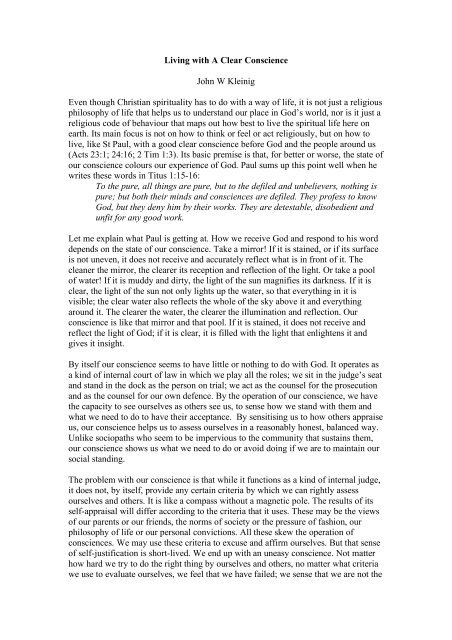
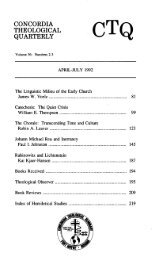
![VI nodaļa: CilvÄks â kas un kÄds viÅÅ¡ ir? [h]](https://img.yumpu.com/48350403/1/190x245/vi-nodaa-1-4-a-cilvaks-a-kas-un-kads-viaa-ir-h.jpg?quality=85)
